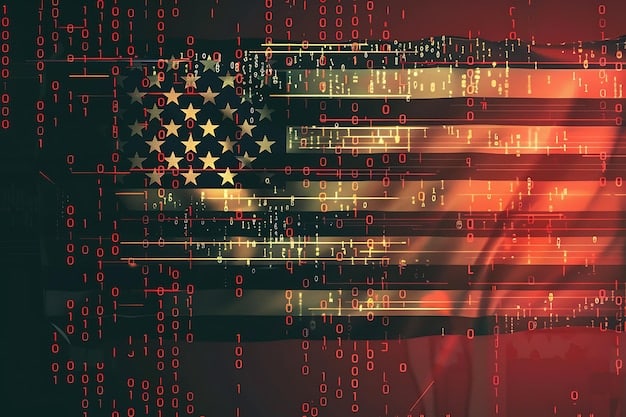Understanding US Cyber Security Stance: 5 Ways It Impacts Your Privacy

Understanding the US Stance on International Cyber Security: 5 Ways It Affects Your Online Privacy involves recognizing how US policies and actions shape global norms. This directly influences how your data is handled, protected, and potentially accessed online.
In an increasingly interconnected digital world, understanding the US Stance on International Cyber Security: 5 Ways It Affects Your Online Privacy is crucial for every internet user. The policies and actions taken by the United States government in the realm of cyber security have a far-reaching impact, shaping global norms and directly influencing your online privacy.
From data protection laws to international agreements, the US approach to cyber security can significantly affect how your personal information is handled, protected, and potentially accessed. Let’s explore how these policies affect your everyday online experiences.
Decoding the US Approach to International Cyber Security
The United States plays a pivotal role in shaping international cyber security norms. The US approach, shaped by a mix of national security concerns, economic interests, and commitment to human rights, sets the stage for global discussions and agreements on cyber security. Understanding the US’s approach involves examining its key policy priorities and how they translate into actions.
National Security Imperatives
A cornerstone of the US cyber security strategy is the protection of national security assets and infrastructure. This imperative drives much of the policy and legislation in this area, focusing primarily on defending against cyber attacks that could compromise critical systems or sensitive information.
Economic and Innovation Protection
The US also prioritizes protecting its economic interests and maintaining a competitive edge in the global digital economy. This involves safeguarding intellectual property, trade secrets, and financial systems from cyber threats. Promoting innovation while ensuring cyber security is a balancing act that influences the shape of US policy.
- Cyber Diplomacy: The US engages in diplomatic efforts to promote international cooperation on cyber security issues.
- Norm Development: It actively participates in the development of international norms and standards for responsible state behavior in cyberspace.
- Capacity Building: The US supports the cyber security capacity of other nations to strengthen global resilience against cyber threats.
Understanding these key elements helps clarify where the US stands on vital issues and how these stances inevitably impact global cyber security and, therefore, your online privacy. It’s a complex web of policies and priorities that shapes the digital landscape we all navigate.

How US Cyber Policies Affect Your Data
One of the most direct ways Understanding the US Stance on International Cyber Security: 5 Ways It Affects Your Online Privacy and affects you is through data protection laws and regulations. The US approach to data privacy, while not as comprehensive as some international standards, still has a significant impact on how companies handle your personal information.
The CLOUD Act
The CLOUD Act allows US law enforcement to access data stored on servers controlled by US companies, regardless of where the data is physically located. This can have implications for individuals whose data is stored in other countries but controlled by US-based companies.
Data Sharing Agreements
The US enters into agreements with other countries to facilitate the sharing of data for law enforcement purposes. These agreements streamline the process of obtaining information from foreign entities, potentially affecting the privacy of individuals who are subject to these data exchanges.
- Limited Federal Framework: Data protection in the US is sector-specific, meaning different laws apply to different types of data.
- California Consumer Privacy Act (CCPA): This state law has set a precedent for stronger data protection measures, influencing other states and potentially federal legislation.
- Global Impact: Because many major tech companies are based in the US, these laws have a global reach, affecting users worldwide.
Understanding these specific regulations and agreements is essential for grasping how the US cyber security policies safeguard your personal data. While the US approach is evolving, these policies have immediate and real impacts on your online privacy.
International Agreements and Cyber Security
The US actively engages in international agreements and collaborations related to cyber security. These agreements shape global norms, standards, and practices which, in turn, affect your online privacy by setting the rules of the game for how governments and corporations handle cyber threats and data protection. Understanding the US Stance on International Cyber Security: 5 Ways It Affects Your Online Privacy involves looking at its participation in these international efforts.
The Budapest Convention
The Budapest Convention on Cybercrime is an international treaty aimed at harmonizing national laws, improving investigative techniques, and increasing cooperation among nations to combat cybercrime. The US is a signatory to this convention, demonstrating its commitment to international collaboration.
Bilateral Agreements
The US also enters into bilateral agreements with other countries to address specific cyber security concerns. These agreements may cover issues such as information sharing, joint training exercises, and coordinated responses to cyber incidents. They provide tailored frameworks for cooperation.
Here’s a quick glance at some key partnerships:
- NATO: Cyber defense is a key area of cooperation within the NATO alliance.
- Five Eyes: The US collaborates with intelligence agencies from the UK, Canada, Australia, and New Zealand to share cyber threat information.
- EU: Ongoing dialogues and agreements address data protection and cyber security standards.
The US involvement in these agreements affects how nations cooperate to deal with cyber threats, which has a direct impact on your own cyber safety and privacy. By engaging in these collaborative efforts, the US contributes to a more secure and stable global cyber environment.

How US Actions Can Impact International Norms
The behavior of the US in cyberspace sets precedents that can influence how other countries approach cyber security. As a major player in the digital realm, the US has a unique responsibility, and its actions inevitably shape international norms and expectations. Understanding the US Stance on International Cyber Security: 5 Ways It Affects Your Online Privacy also requires analyzing how its actions can have unintended impacts on global cyber norms.
Offensive Cyber Operations
The US has been known to conduct offensive cyber operations to counter threats and protect its interests. While these actions are often justified as necessary for national security, they can also raise concerns about the potential for escalation and the erosion of norms against aggressive cyber behavior.
Surveillance Practices
Revelations about US surveillance practices have raised questions about the balance between national security and individual privacy. These concerns have prompted calls for greater transparency and accountability in government surveillance activities.
Some key discussion points involve:
- Setting Standards: US actions influence the expectations of responsible state behavior in cyberspace.
- Balancing Act: The US must balance its national security interests with the need to uphold privacy and human rights.
- Global Debate: US policies are often subject to international scrutiny, contributing to ongoing discussions about cyber norms.
By analyzing past actions and the ongoing debates, we can better understand how US behavior in cyberspace shapes the global cyber landscape and affects your privacy and security.
Mitigating the Risks and Protecting Your Privacy
Given the complexities of international cyber security and the various ways in which US policies can affect your online privacy, it’s important to take proactive steps to protect yourself. Practical measures, combined with a clear understanding of the current landscape, can significantly enhance your cyber security posture. Understanding the US Stance on International Cyber Security: 5 Ways It Affects Your Online Privacy is only the fist step; taking action is vital.
Use Strong Passwords
One of the most basic yet effective measures is to use strong, unique passwords for all of your online accounts. A password manager can help you generate and store complex passwords securely.
Enable Two-Factor Authentication
Two-factor authentication adds an extra layer of security to your accounts by requiring a second verification step, such as a code sent to your phone, in addition to your password.
Stay Informed
Keeping up with the latest news and developments in cyber security can help you stay ahead of potential threats and adapt your practices accordingly. Awareness empowers you to make informed decisions about your online behavior.
To enhance your personal cyber security, consider:
- VPN Use: Use a Virtual Private Network (VPN) to encrypt your internet traffic and protect your IP address.
- Privacy Settings: Regularly review and adjust the privacy settings on your social media accounts and other online services.
- Software Updates: Keep your devices and software up to date with the latest security patches.
By taking these practical steps, you can mitigate the risks to your online privacy and enhance your overall cyber security. Remember, cyber security is an ongoing process that requires vigilance and proactive measures.
| Key Point | Brief Description |
|---|---|
| 🛡️ US Cyber Strategy | Focuses on national security and economic protection. |
| 🌐 Int’l Agreements | The US collaborates globally to combat cyber threats. |
| 🔒 Data Protection | US laws like the CLOUD Act impact global data handling. |
| 👤 Privacy Actions | Use strong passwords, VPNs, and adjust privacy settings. |
Frequently Asked Questions
The US stance shapes global norms and policies, influencing how your data is protected or accessed. This is especially relevant if you use services from US-based companies.
The CLOUD Act allows US law enforcement to access data stored on US-controlled servers, even if located abroad, potentially impacting the privacy of your data.
The US is part of the Budapest Convention and various bilateral agreements aimed at combating cybercrime and enhancing cyber security cooperation globally.
Use strong passwords, enable two-factor authentication, use VPNs, and regularly review your privacy settings on social media and other online platforms.
Because US policies have a global reach, impacting data flows, privacy standards, and cyber security practices worldwide. Understanding these policies helps you make informed choices.
Conclusion
Understanding the intricate relationship between the US stance on international cyber security and your online privacy is paramount in today’s digital age. By recognizing how US policies shape global norms and impact data handling, you can take proactive steps to safeguard your personal information.
Staying informed, using strong security practices, and advocating for better data protection are ways to promote greater privacy and security in an interconnected world. The journey to protect your online privacy begins with understanding the US Stance on International Cyber Security: 5 Ways It Affects Your Online Privacy and taking control of your digital footprint.





